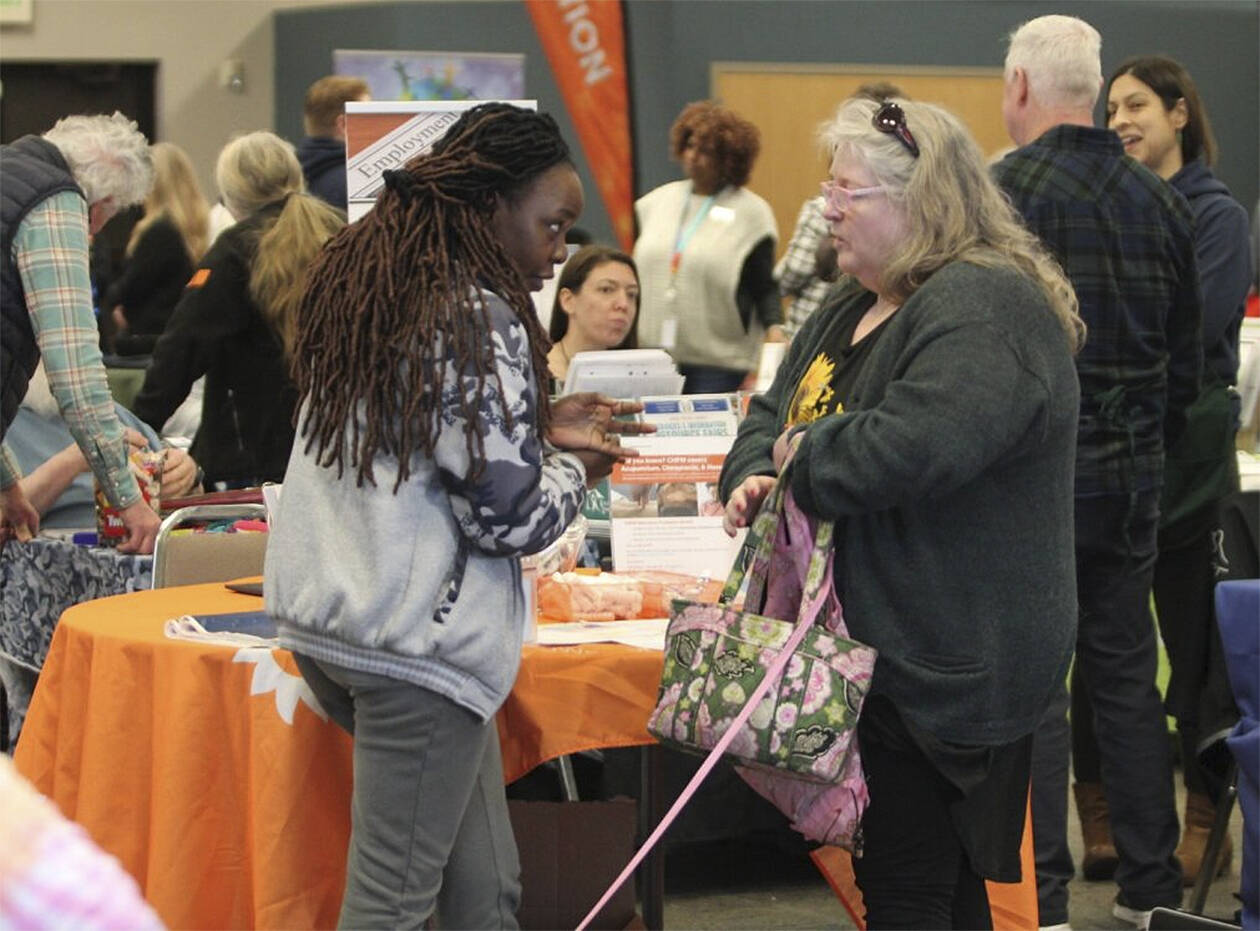There are hundreds of people in Kitsap County whose lives are in crisis. Their daily struggles may not always be obvious — but to the trained service providers for at-risk and houseless people in Kitsap and beyond their calls for help are louder than ever.
Project Connect held its second annual Community Resource Fair for low-income families over three days and at three locations throughout the county.
Over 30 social service providers and government agencies from every corner of the peninsula tabled at each event, addressing needs from immigration services to childcare to outdoor living supplies, all for free — plus a hot lunch on offer for all attendees. The Poulsbo event saw close to 20 clients, up from around 10 in 2022, but Bremerton attendance hit 175 and Port Orchard saw closer to 60.
“Homelessness in Washington is so hard because it’s rural [here], and people can slip through the cracks,” said Chala Gray, a counselor with low-income health insurance Wellpoint. “Events like these are great because people can connect with lots of different services at once.”
The resource fair coincided with the annual Point-In-Time count, a federal population metric used to measure the number of unhoused people in every county. Last year, the Kitsap count found that the number of people living outside had risen to 245 — the most in county history, and up 34% since 2022. The total number of unhoused people in the PIT count was 604, including those in transitional housing and emergency shelters.
The timing was no accident, explained Project Connect site coordinator Shannon Turner. By offering a “one-stop shop” for services, the county can draw in both unhoused people for the count and those who are housed but still struggling. “This is where you see it all tying in together because we’re not just here to help those who are homeless. It also helps us connect and get stronger and talk about the available resources,” Turner said.
The PIT count measures people who are “unhoused,” including those in transitional and emergency housing, but that’s not the whole picture, said Maggie Healy, coordinator assistant of state childcare department Head Start. Many Kitsap residents might be “housed” by the state’s definition, but there are many more barely scraping by.
“Affordability has become the main problem. The cost of living is astronomical,” Healy said. “Food stamps TANF (Temporary Assistance for Needy Families) are not meeting people’s basic needs anymore. [Parents] may want to give family healthy food, or get childcare, but can’t afford it.”
Other social workers at the event concurred with Healy, but also cited the lack of public transportation in Kitsap and depleted resources for aid post-pandemic as roadblocks against progress.
Katy Knudsen, grant manager of the Catholic Community Services Housing and Essential Needs program, said that the fluxes in the county’s budget brought on by the sunset of state pandemic relief make planning difficult. “We’ve been spent out since November,” Knutsen said. A backfill “would be great, but rent went up.”
Meanwhile, in Port Orchard, Roland Arper, a member of Kitsap Project Connect, said, “We’re seeing an older population this year and much more of those with greater medical needs. We have more this year already with multiple people in wheelchairs and walkers and mobility issues.”
Dozens of people seeking free and reduced services walked in the doors of the Port Orchard United Methodist Church, where they were greeted by representatives of a variety of local, county and statewide organizations that assist low-income and homeless people and families.
Susan Schultheis said while waiting to get her COVID shot that even though she feels blessed, the money is always short these days. “I was very fortunate that I got into Orchard Bluff, which is absolutely wonderful. If I had to try to do it with my minimal retirement and my social security, I don’t know where I would be.”
Wanda Young, 60, said she is not homeless but struggling to keep a roof over her head, a struggle she feels was created by county programs that don’t meet people on their level. “Don’t make me run to every freaking place to get something,” she said. “It feels like I got to fight for crumbs sometimes.”
Housing and homelessness division specialist Cory Derenburger said the fairs play an important part in jump-starting conversations with those seeking crucial living assistance. “They are able to come meet somebody in person where they live at,” he said. “I mean, we try to make sure that we’ve got the fairs around the county in the north, central and south parts.”
There isn’t one on Bainbridge Island.
The state Department of Licensing was a new service at the fairs highlighted by Derenburger, issuing identification cards for state IDs and driver’s licenses. People are also coming for the free vaccine clinic through Kitsap Public Health District for COVID, flu and child immunizations, he added.
While this event is great, Derenburger said those in need can call 211 to connect to community resources. “If they’re having difficulties getting services, different agencies have their different programs that they offer,” he said.



